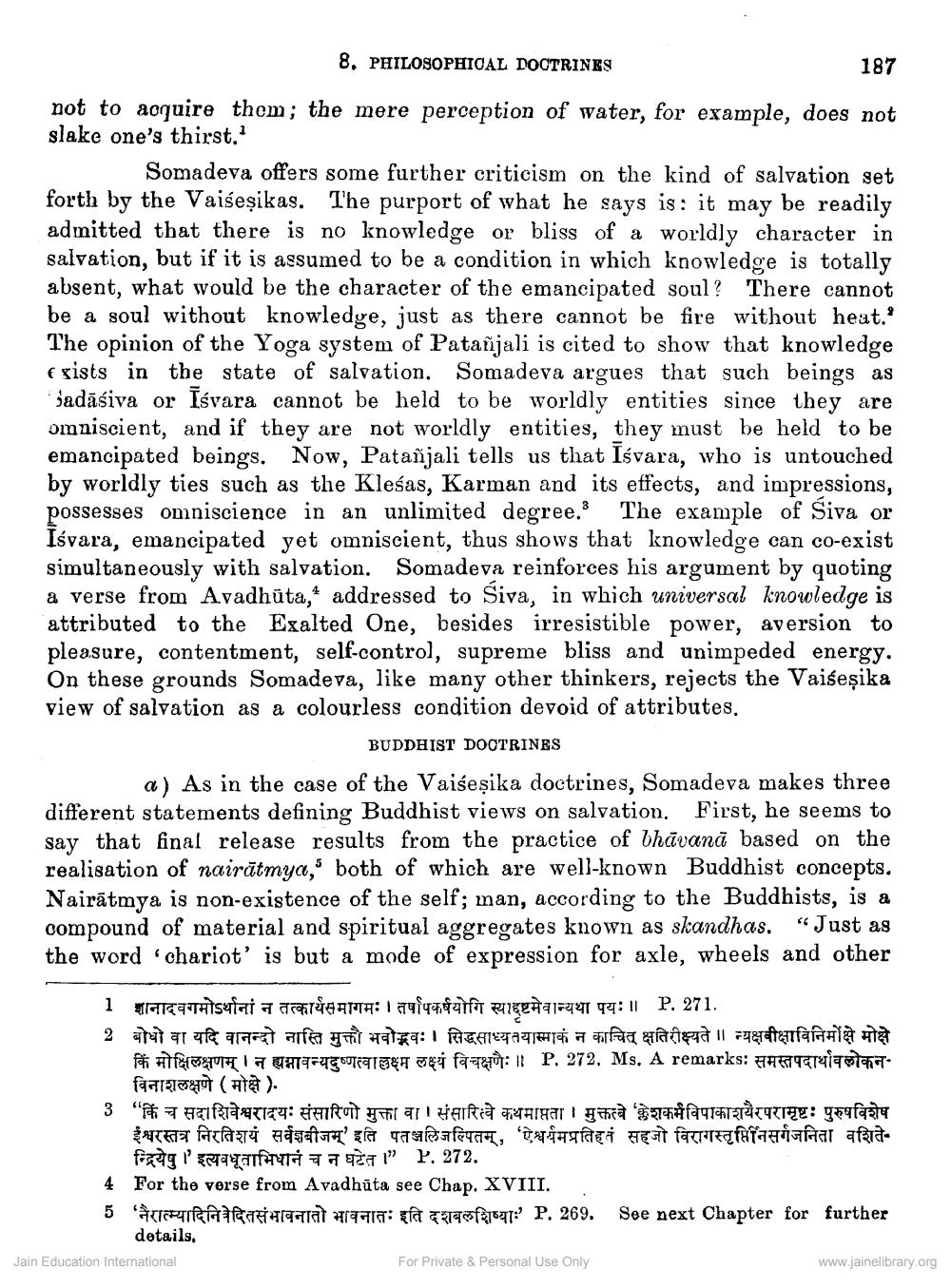________________
8. PHILOSOPHICAL DOCTRINES
187
not to acquire them; the mere perception of water, for example, does not slake one's thirst.1
Somadeva offers some further criticism on the kind of salvation set forth by the Vaiseṣikas. The purport of what he says is: it may be readily admitted that there is no knowledge or bliss of a worldly character in salvation, but if it is assumed to be a condition in which knowledge is totally absent, what would be the character of the emancipated soul? There cannot be a soul without knowledge, just as there cannot be fire without heat." The opinion of the Yoga system of Patanjali is cited to show that knowledge exists in the state of salvation. Somadeva argues that such beings as jadasiva or Isvara cannot be held to be worldly entities since they are omniscient, and if they are not worldly entities, they must be held to be emancipated beings. Now, Patanjali tells us that Iśvara, who is untouched by worldly ties such as the Klesas, Karman and its effects, and impressions, possesses omniscience in an unlimited degree. The example of Siva or Isvara, emancipated yet omniscient, thus shows that knowledge can co-exist simultaneously with salvation. Somadeva reinforces his argument by quoting a verse from Avadhuta, addressed to Śiva, in which universal knowledge is attributed to the Exalted One, besides irresistible power, aversion to pleasure, contentment, self-control, supreme bliss and unimpeded energy. On these grounds Somadeva, like many other thinkers, rejects the Vaiseşika view of salvation as a colourless condition devoid of attributes.
BUDDHIST DOCTRINES
a) As in the case of the Vaiseṣika doctrines, Somadeva makes three different statements defining Buddhist views on salvation. First, he seems to say that final release results from the practice of bhavana based on the realisation of nairatmya, both of which are well-known Buddhist concepts. Nairatmya is non-existence of the self; man, according to the Buddhists, is a compound of material and spiritual aggregates known as skandhas. "Just as the word 'chariot' is but a mode of expression for axle, wheels and other
1 ज्ञानादवगमोऽर्थानां न तत्कार्यसमागमः । तर्षापकर्षयोगि स्याद्दृष्टमेवान्यथा पयः ॥ P. 271.
2 बोधो वा यदि वानन्दो नास्ति मुक्तौ भवोद्भवः । सिद्धसाध्यतयास्माकं न काचित् क्षतिरीक्ष्यते ॥ न्यक्षवीक्षाविनिमोंक्षे मोक्षे किं मोक्षिलक्षणम् । न ह्यग्नावन्यदुष्णत्वालक्ष्म लक्ष्यं विचक्षणैः ॥ P. 272. Ms. A remarks: समस्तपदार्थावलोकनविनाशलक्षणे (मोक्षे ).
3 "किं च सदाशिवेश्वरादयः संसारिणो मुक्ता वा । संसारित्वे कथमाप्तता । मुक्तत्वे 'क्लेशकर्मविपाकाशयैरपरामृष्टः पुरुषविशेष ईश्वरस्तत्र निरतिशयं सर्वज्ञबीजम्' इति पतञ्जलिजल्पितम्, 'ऐश्वर्यमप्रतिहतं सहजो विरागस्तृप्तिनिसर्गजनिता वशितेन्द्रियेषु ।' इत्यवधूताभिधानं च न घटेत " P. 272.
4 For the verse from Avadhuta see Chap. XVIII.
5 ' नैरात्म्यादिनिवेदितसंभावना तो भावनातः इति दशबलशिष्याः' P. 269. details,
Jain Education International
For Private & Personal Use Only
See next Chapter for further
www.jainelibrary.org




